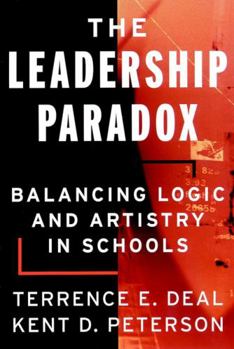The Leadership Paradox: Balancing Logic and Artistry in Schools
Select Format
Select Condition 
Book Overview
"A distinctive, playful, and insightful look at the art and craftof leading a modern-day school."
--Roland S. Barth, educator and author of Improving Schools fromWithin "Reality-based cases and concepts worthy of reflection by all whoare interested in improving school leadership.''
--Linton Deck, director of education and nonprofit applications, Center for Creative Leadership "Required reading for those who are or aspire to be principals andfor those who prepare, train, or supervise them."
--Laraine Roberts, director of research and development, CaliforniaSchool Leadership Academy Rather than view leadership and management as opposing factions, this book shows how the two ideals can serve as complements inbuilding powerful school culture. The authors share real-lifestories and examples of school leaders who have learned to adopt abifocal approach and integrate the contradictions of their work.
--Roland S. Barth, educator and author of Improving Schools fromWithin "Reality-based cases and concepts worthy of reflection by all whoare interested in improving school leadership.''
--Linton Deck, director of education and nonprofit applications, Center for Creative Leadership "Required reading for those who are or aspire to be principals andfor those who prepare, train, or supervise them."
--Laraine Roberts, director of research and development, CaliforniaSchool Leadership Academy Rather than view leadership and management as opposing factions, this book shows how the two ideals can serve as complements inbuilding powerful school culture. The authors share real-lifestories and examples of school leaders who have learned to adopt abifocal approach and integrate the contradictions of their work.
Format:Paperback
Language:English
ISBN:0787955418
ISBN13:9780787955410
Release Date:September 2000
Publisher:Jossey-Bass
Length:160 Pages
Weight:0.50 lbs.
Dimensions:0.5" x 6.0" x 8.9"
Customer Reviews
2 ratings
The title is as the title does...
Published by Thriftbooks.com User , 15 years ago
The Leadership Paradox provides insight into the varying degrees and criteria for decisions on how a person wants to be perceived as an educational leader. Deal states cases, all the options (this is where the paradoxical/ dichotomous writing comes in) and what certain educational leaders decided to do (since the cases were real). I happened to have this book assigned to me in a class, and (while I am a long time educational leader) the book gave me some things to think about in terms of management style extending into leadership, the mundane to spiritual aspects of leading people in schools, and reconsidering some of the options which, through time, I had forgotten as options in leadership (a person can get bogged down in the mundane). Personally, I have my own "short hand" adages, and when first reading the book I wondered why the dichotomous writing was so important. (I.e.: Wouldn't it have been more efficient to just make a statement rather than dally around in these degrees of getting things done?) But I pondered and realized that a review of leadership options is important. If nothing else, for a person that has some established management and leadership patterns, the book was useful for reconsidering the fact I do have options, and I do make choices. This book is solid professional development reading for the educational leader.
An eminently wise and practical (hand)book
Published by Thriftbooks.com User , 23 years ago
Deal and Peterson are on to a--paradoxically--simple and yet equally profound truth: leadership is a paradoxical enterprise. The heart of their analysis focuses on the false dichotomy between (left-brained) rational-technical-logical "management" and (right-brained) symbolic-artistic-passionate "leadership." As their title suggests, they wisely conclude that the most effective school leaders practice a more balanced "bifocal" approach.Most of us probably tend naturally to prefer one of these approaches over the other. We are thus likely to recognize both ourselves and our nemeses described in the authors' discussions of the respective strengths and weaknesses inherent in these two contrasting styles. Their answer, predictably, is to encourage us to cleave to a more paradoxically-sensitive middle way, or "via media." I tend to agree.If you happen to see life as rife with paradox and ambiguity already anyway, you are unlikely to learn anything earth-shakingly new from Deal and Peterson's account in this book. But I don't want this review to sound too ambivalent. Paradoxically, perhaps, I found this to be a thoroughly worthwhile work to read--despite its (un)remarkably (extra)ordinary thesis.






